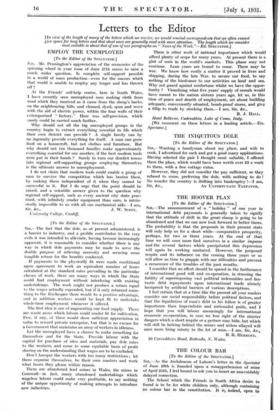Letters to the Editor
fin view of the length of ninny of the letters which we receive, we would remind correspondents that we often cannot give space for long letters and that short ones are generally read with more attention. The length which we consider nwst suitable is about that of one of our paragraphs on " News of the Week."—Ed. SpzerAroa.]
EMPLOY THE UNEMPLOYED
[To the Editor of the SPECTATOR.]
Sin,- -Mr. Pennington's appreciation of the economics of the spinning wheel in your issue of June 27th seems to raise a much wider question. Is complete self-support possible in a world of mass production—even for the masses which that world is unable to employ any longer and has thrown off ?
At the Friends' self-help centre, here in South Wales, I have recently seen unemployed men making cloth from wool which they received as it came from the sheep's backs, on the neighbouring hills, and cleaned, dyed, spun and wove with the aid of electric power, within the four walls of their extemporized "factory." Here was self-provision, which curely could be carried much further.
Why should not all the big unemployed groups in the country begin to extract everything essential to life which their own district can provide ? A single family can by no ingenuity provide everything for itself. A man can grow food on a homecroft, but not clothes and furniture. But why should not ten thousand families make approximately everything essential for one another, if the best modern tools were put in their hands ? Surely to turn our derelict towns into regional self-supporting groups employing themselves is the ultimate answer to unemployment.
I do not claim that modern tools could enable a group of men to survive the competition which has beaten them, by making them independent of it when they cannot be successful in it. But I do urge that the point should be raised, and a scientific answer given to the question why regional self-support, such as every ancient city state prac- tised, with infinitely cruder equipment than ours, is intrin- sically impossible to us with all our mechanical aids.—I am,










































 Previous page
Previous page